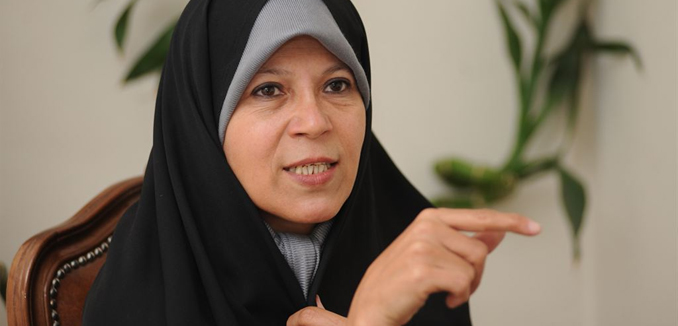A meeting between the daughter of a prominent ayatollah and a leader of the Bahai faith in Iran this week has provoked outrage among the country’s elite and underscored the religious intolerance of its government, The New York Times reported on Wednesday.
Faezeh Hashemi, daughter of Ayatollah Ali Akbar Hashemi Rafsanjani, a former president of the Islamic Republic and current chairman of the expediency council, has been roundly blasted by the country’s clerical leadership for paying a house visit to Fariba Kamalabadi, an imprisoned Bahai leader who has been furloughed for a short time.
Kamalabadi, along with six other Bahai leaders in Iran, was sentenced to twenty years in prison after being convicted in 2010 of crimes including “espionage for Israel,” “insulting religious sanctities,” and spreading “propaganda against the system,” according to Amnesty International. Kamalabadi and Hashemi met in prison in 2013, when the latter was sentenced to six months for “spreading propaganda against the system.”
Hashemi has a reputation for being outspoken. She previously started a newspaper for women and is believed to be the first woman of the Iranian establishment to publicly ride a bicycle, challenging the religious dictates of the government.
According to the Times, Hashemi is “shielded from punishment by her powerful family connections.” However, her father has condemned her for meeting with “heretics,” saying, “She has committed a wrong deed and should be ashamed of herself,” according to an Iranian media report.
Another official called on Hashemi to offer “an apology to the nation.”
Ayatollah Sadegh Larijani said that Hashemi could be prosecuted for violating national security guidelines. “Socializing with them, especially relatives of senior clerics and high-ranking officials, is damaging the norms,” Larijani said, according Iran’s semi-official Tasnim news agency.
“The leader of their cult is Zionism,” said Brig. Gen. Mohammad Reza Naghdi, the commander of Iran’s paramilitary Basij militia, in a possible reference to the fact that the Bahai world headquarters is located in Haifa, Israel. “Supporting them means being a lackey of the Zionists,” he added.
Bahais, who believe that there was a prophet subsequent to Muhammad, are considered heretical and impure in Iran. They have faced intense repression since the 1979 Islamic Revolution, and are barred from pursuing higher education or jobs in civil service.
The continuing mistreatment of the Bahai, as evidenced by the continued imprisonment of Kamalabadi and her six co-religionists, was construed as a sign that Iran had failed to improve its human rights record by former State Department official Elliott Abrams two years ago.
A few months later, the Bahai International Community blasted Iran for failing to live up to the commitments it made to the United Nations Human Rights Council to “improve human rights in relation to its treatment of Bahais.”
[Photo: Fetan ]




